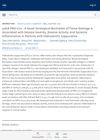 15 citations,
June 2019 in “Experimental Dermatology”
15 citations,
June 2019 in “Experimental Dermatology” Old neuropharmacological drugs might be effective for treating inflammatory skin diseases.
6 citations,
June 2023 in “American Society of Clinical Oncology Educational Book” Cannabis, cryotherapy, and scalp cooling can help improve the quality of life for chemotherapy patients.
 4 citations,
June 2022 in “BioMed Research International”
4 citations,
June 2022 in “BioMed Research International” Using mesenchymal stem cells or their exosomes is safe for COVID-19 patients and helps improve lung healing and oxygen levels.
 2 citations,
April 2021 in “Cureus”
2 citations,
April 2021 in “Cureus” Two new reliable Arabic questionnaires for measuring quality of life in women with PCOS were created, one for married and one for unmarried women.
 1 citations,
July 2023 in “International Journal of Molecular Sciences”
1 citations,
July 2023 in “International Journal of Molecular Sciences” Old psychiatric drugs are increasingly being used for new purposes, and technologies like SmartCube® help create new drugs.
1 citations,
July 2022 in “JEADV Clinical Practice” New and existing treatments for hair loss show promise, with some being more effective for men and others for women.
 November 2024 in “Applied Sciences”
November 2024 in “Applied Sciences” Wild strawberry waste extract can be a sustainable cosmetic ingredient for treating acne and hair loss.
 May 2023 in “Cytotherapy”
May 2023 in “Cytotherapy” Hair follicle and adipose cell vesicles both protect neurons and reduce inflammation similarly.
 April 2023 in “International Journal of Research in Dermatology”
April 2023 in “International Journal of Research in Dermatology” Baricitinib is a promising treatment for severe alopecia areata with minimal side effects.
 September 2024 in “Journal of the American Academy of Dermatology”
September 2024 in “Journal of the American Academy of Dermatology” PRO-C22 can help diagnose and monitor the severity of hidradenitis suppurativa.
Targeting CXXC5 and GSK-3β may help treat male pattern baldness.
278 citations,
May 2013 in “Ca” Targeted anticancer therapies can cause severe side effects similar to traditional chemotherapy, but with different types.
88 citations,
August 2019 in “Frontiers in immunology” Tyrosine kinases are important in skin autoimmune diseases and could be targets for new treatments.
55 citations,
April 2015 in “BMC medicine” Stem Cell Educator therapy helps regrow hair and improve life quality in alopecia areata patients.
40 citations,
June 2021 in “Clinical, cosmetic and investigational dermatology” JAK inhibitors show promise in effectively treating hair loss from alopecia areata.
25 citations,
January 2015 in “World journal of stem cells” Hair follicle stem cells can become different cell types and may help treat neurodegenerative disorders.
21 citations,
November 2021 in “Cells” Hedgehog pathway inhibitors can treat certain aggressive cancers but face limitations like resistance and side effects.
18 citations,
July 2015 in “Drug Healthcare and Patient Safety” Hormone therapy for prostate cancer can increase heart risks, especially in men with heart conditions.
17 citations,
April 2021 in “Frontiers in Pharmacology” Activating Nrf2 can help protect against hearing loss.
 16 citations,
March 2022 in “Archives of Toxicology”
16 citations,
March 2022 in “Archives of Toxicology” Botulinum and tetanus neurotoxins are better understood now, with updated information on their effects and treatment.
 12 citations,
October 2021 in “Cells”
12 citations,
October 2021 in “Cells” Targeting a protein that blocks hair growth with microRNAs could lead to new hair loss treatments, but more research is needed.
 6 citations,
November 2022 in “Journal of autoimmunity”
6 citations,
November 2022 in “Journal of autoimmunity” JAK inhibitors like tofacitinib may effectively treat Alopecia Areata.
 4 citations,
November 2021 in “Cancers”
4 citations,
November 2021 in “Cancers” The document concludes that understanding and managing hair loss in cancer patients is important, and more research is needed for better treatments.
4 citations,
January 2018 in “Journal of dermatology & dermatologic surgery” There is no gold standard treatment for hidradenitis suppurativa due to insufficient evidence.
 2 citations,
October 2022 in “Current Allergy and Asthma Reports”
2 citations,
October 2022 in “Current Allergy and Asthma Reports” Biologic therapies can cause various adverse events, but allergy/immunology clinicians can manage them.
 2 citations,
November 2021 in “ACG Case Reports Journal”
2 citations,
November 2021 in “ACG Case Reports Journal” Tofacitinib successfully treated hair loss in a Crohn's disease patient who previously used adalimumab.
1 citations,
April 2023 in “Heliyon” Disitamab vedotin and gemcitabine effectively treated bladder cancer without major side effects.
 January 2023 in “IntechOpen eBooks”
January 2023 in “IntechOpen eBooks” The document concludes that specific methods for making diazine-based drugs can lead to high yields and are important for creating effective treatments for various diseases.
189 citations,
July 2009 in “The Journal of clinical investigation/The journal of clinical investigation” Epidermolysis bullosa simplex causes easily blistered skin due to faulty skin cell proteins, leading to new treatment ideas.
127 citations,
August 2016 in “The oncologist” Understanding and managing side effects of hedgehog pathway inhibitors can improve treatment for advanced basal cell carcinoma.















